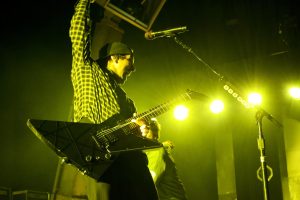Commentary: The importance of truth
November 11, 2009
On Nov. 4, Suffolk had its annual fall debate between College Democrats and College Republicans. The debate was lively, until one of the speakers stated that (we are paraphrasing), “there is no Taliban or al Qaeda in Afghanistan.” For anyone who performs a cursory inspection of a newspaper, watches TV news for more than three minutes, or even dares to see the headlines posted on the internet, the utter absurdity of the comment was as plain as a blood stain on a white shirt.
When other participating members were questioned as to whether they had anything to add, there was no real response. According to Suffolk GOP debater, Jim Wilson, he offered a short retort. Regardless, this was to no avail. No concerted effort against this barefaced fallacy was launched. The blatant subversion of truth was essentially ignored and the debaters were off to another topic.
Let us take a moment to observe the facts. Even when one ignores that the 9/11 terror attacks originated in Afghanistan, since the attacks, the AP has reported that over 3,400 al Qaeda members have been killed in that country. The Afghan Interior Minister stated in February that 10,000-15,000 Taliban were fighting in the country. Considering al Qaeda is an extremely loose network, this also doesn’t account for the hundreds, if not thousands, of members and sympathizers slipping in and out of Afghanistan and Pakistan on an almost daily basis. New York Times reporter, David Rhode, who recently escaped his kidnapping by the Taliban, described the ambiguity of our enemies and the situation on the ground.
“After seven years of reporting in the region, I did not fully understand how extreme many of the Taliban had become. Before the kidnapping, I viewed the organization as a form of ‘Al Qaeda lite,’ a religiously motivated movement primarily focused on controlling Afghanistan.” Rhode continued, “I learned that the goal of the hard-line Taliban was far more ambitious …They wanted to create a fundamentalist Islamic emirate with Al Qaeda that spanned the Muslim world.” Whether our enemies have adopted the Taliban or al Qaeda monikers, their goals are the same, and they are surely operating in Afghanistan.
If you don’t believe the authors, Rhode, or major press agencies, try asking a bereaved Afghan mother who has lost a child due to a Taliban bomb, a Marine in Helmand province who devotes a large part of his day to disarming al Qaeda IEDs, or the UN World Food Program which lost six of its members in an Oct. 28 Taliban attack.
As firm believers in free thinking and discourse amongst a large group of peers to rationalize and discuss the events of today’s political realm, we must maintain and respect the essence of truth in our discussions in order to provide an environment truly conducive to education.
The lack of a real response by the event’s organizers, moderators, or by other students was a true smear on the academic legacy we should all wish to further.
On Nov. 5, Scottish TV reported that one in 20 UK school children thought Adolf Hitler was a German soccer coach, while one in six thought that Auschwitz was a WWII theme park.
Incredible, considering United Kingdom suffered some of the worst damage of the war and deployed millions of troops in Europe and around the world. Of course, these students are young and still learning basic historical facts. The difference between Thursday’s comment and the responses by British pre-teens, is that the war and our enemies are hardly historical memories. At Suffolk, we attend classes with a number of students who were busy fighting the “non-existent” Taliban and in terms of academic development, we are markedly more mature. Put more succinctly, it is not the British schoolchildren who should feel shame.
As students, intellectuals, and faculty who are tasked with the endeavor to educate and expand the intellect and wisdom of those less experienced, we must not tolerate those who become counterproductive to the learning of others. The rhetoric of those who beset the free flow of ideas with lofty and convoluted pretenses should be redirected to the correct path.
Never should any of us allow, especially those in positions of leadership, for a situation to develop which has completely disregarded the essence of truth in our discourse. As a university, we must build forums for discourse and dialogue to nurture young minds into free thinkers.





